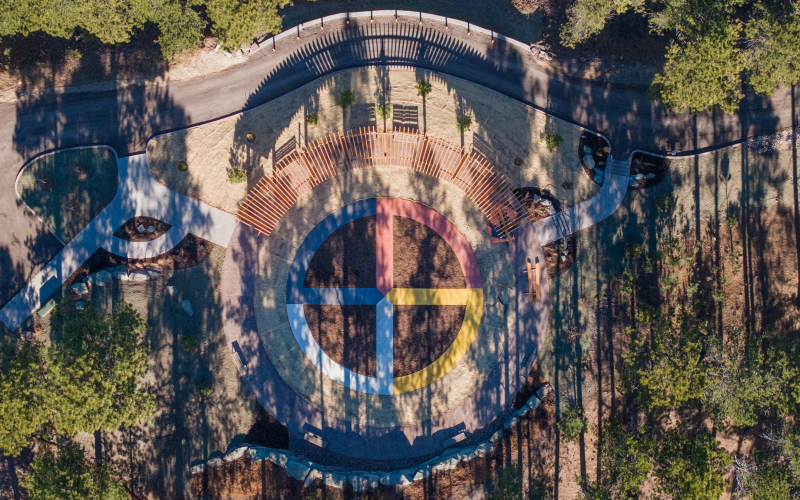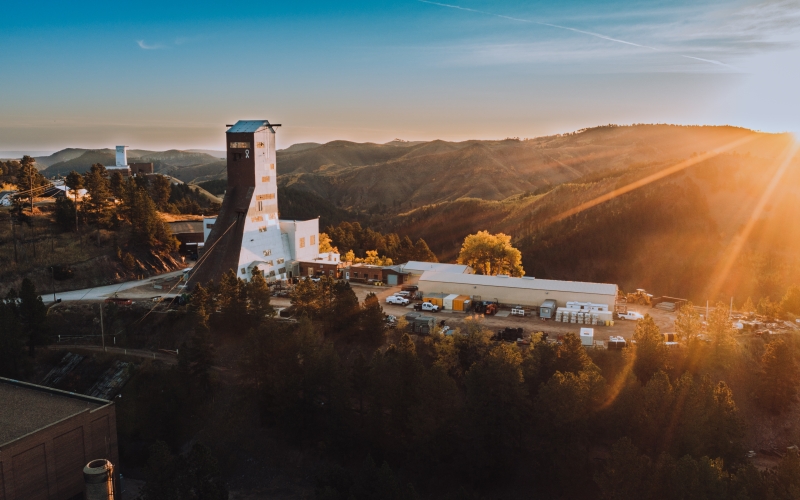
Casey Peterson speaks at an event at the dedication of the Sanford Lab Homestake Visitor Center.
This year, Casey Peterson became a major donor to the Sacred Circle Garden project, an initiative of the Sanford Underground Research Facility (SURF) Foundation. The project, Peterson says, lies at the intersection of his connection to the Black Hills.
The site,
“This is a keystone project to honor and respect the people who have come before us, to honor and respect the land, and to create a place for education and multicultural exchange,” Peterson said.
Peterson’s connection to and respect for the Black Hills of South Dakota has been built over a lifetime.
The great-grandson of an Irish settler and an Oglala Lakota Sioux native, Peterson’s genealogical roots in the state date back to the 1700s. Although Peterson’s early life was spent in California, he spent his summers in the Black Hills until his family moved to South Dakota. Shortly after graduating from the University of South Dakota in 1975, Peterson started an accounting and financial advising firm in Rapid City. For 53 years, Peterson has lived in western South Dakota and invested in the future of the state.
“South Dakota is home, and that’s why it’s important to acknowledge the history of this place and invest in its future, in the creation of opportunities for South Dakotans,” Peterson said.
In 2004, the South Dakota State Legislature formed the South Dakota Science and Technology Authority (SDSTA) to oversee the transformation of the Homestake Gold Mine into an underground research facility. Peterson has served as a member of the SDSTA Board of Directors since 2004 and as its chairperson since 2009. In this period, SURF has become a world-leading research facility that hosts 27 experiments in particle and astrophysics, geology, biology and engineering.
Peterson’s leadership and support of SURF continued in 2019, when he became a founding board member of the SURF Foundation, a non-profit entity that supports SURF’s long term vision: to advance world class science and inspire learning across generations. Today, he continues to offer guidance to the SURF Foundation Board of Directors as an ex officio member.
The Sacred Circle Garden is the first initiative of the SURF Foundation; Peterson says it’s the perfect place to start.
“The vision of SURF is to create a place where people from around the world advance the disciplines of science, technology, engineering and mathematics [STEM] and STEM education and outreach,” Peterson said. “The Sacred Circle Garden will create a place of cultural exchange for everyone who comes to the site—researchers, students, educators and visitors—to appreciate the beauty, history and uniqueness of the Black Hills.”
Peterson, an enrolled member of the Oglala Lakota Sioux Tribe, along with K.C. Russell, SURF’s cultural liaison and enrolled member of the Lower Brule Sioux Tribe, have worked with South Dakota tribal leaders and elders to gain insight, feedback and support for the Sacred Circle Garden.
The input of tribal leaders has greatly influenced the design of the garden, which is located at the heart of the Paha Sapa, includes a medicine wheel and features four significant areas: Mato Paha (Bear Butte), Mato Tipila (Bear’s Lodge/Devil’s Tower), Hehaka Sapa (Black Elk Peak) and the Mako Sica (Badlands), all sacred sites for the Lakota and other regional tribes.
“I hope my gift will encourage others to contribute to this project,” Peterson said. “It’s important for us to understand and preserve the history and the sanctuary of the Black Hills, and to envision what SURF will do in the future.”
The SURF Foundation announced plans for this project in July 2021, after an employee fundraising campaign raised initial support for the project. The SURF Foundation is on track to raise 50% of the funds by December 2021 and 100% by Summer 2022. Groundbreaking for the
To make a donation to the SURF Foundation or learn more, contact Staci Miller or visit the Čhaŋgléška Wakȟáŋin webpage.

